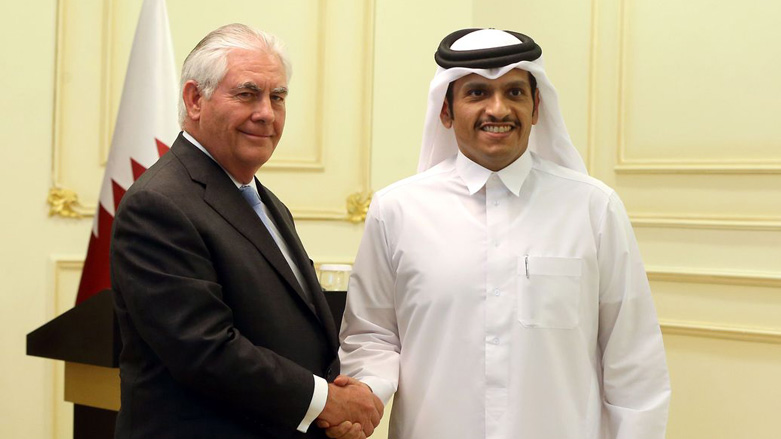US reaches agreement with Qatar on combatting terrorism financing

WASHINGTON DC, United States (Kurdistan24) – US Secretary of State Rex Tillerson visited Qatar on Tuesday, where he signed a Memorandum of Understanding (MOU) on counterterrorism financing.
As Tillerson explained in a Doha press conference, the bilateral US-Qatari agreement is separate from the dispute between Qatar and Saudi Arabia, Bahrain, Egypt and the United Arab Emirates (UAE) that erupted in early June.
The diplomatic process that produced Tuesday’s agreement actually began “as long as a year ago,” Tillerson stated. Qatar’s lax attitude toward terrorist financing was also a concern of the previous administration.
However, the May summit in Riyadh, which President Donald Trump attended along with the leaders of 54 Muslim-majority countries, reinvigorated those discussions, Tillerson explained.
While State Department officials are keen to separate Tuesday’s agreement from the feud between the Saudi-led Arab coalition and Qatar, it is hard to avoid concluding that there is probably some link.
Indeed, following Tuesday’s announcement, Saudi Arabia and its allies issued a statement in which they seemed to take some credit for the MOU. They affirmed that it followed on “repeated pressures and demands over the past years to Qatar to stop supporting terrorism.”
Qatar’s population is tiny: just 200,000 native citizens. But it has the world’s third-largest energy reserves, and Qataris enjoy the world’s highest per capita income.
Qatar is a vulnerable and tempting target (as Kuwait was to Saddam Hussein.)
Before its dispute with Riyadh erupted, a small number of Turkish troops were stationed in the sheikhdom, ostensibly to train Qatar’s small army. Within two days of Riyadh’s June 5 announcement that it was breaking diplomatic relations with Qatar and closing the border, Qatar asked Ankara to send more troops and the Turkish parliament approved the request.
Because of its vulnerability, Qatar tries to maintain good relations with a wide range of parties, some sworn enemies of each other. Thus, it hosts the largest US base in the Middle East and also supports groups that the US has designated as terrorist organizations.
They include Hamas, whose leader, Khaled Meshaal, lives in Qatar. After Qatar signed the MOU, its special envoy to Gaza affirmed that Qatar would continue funding humanitarian projects in the Hamas-controlled Gaza Strip.
Qatar is the largest funder of such efforts and is currently building a new neighborhood: “Hamad,” named after the father of Qatar’s current emir, Hamad al-Thani.
Hamad ousted his own father in 1995, after which he launched al-Jazeera television and otherwise set Qatar on the outsized role that it now plays.
The US hopes that more countries will sign similar agreements on countering terrorism financing. As State Department Spokesperson, Heather Nauert told reporters on Tuesday, the accord is “a good example” for others, and we hope “they will come to the table with us as well.”
R.C. Hammond, a communications adviser to Tillerson and formerly press secretary to Newt Gingrich and other Republican congressmen, remarked: “It’s a two-way street.” Seemingly alluding to Riyadh’s laxity in blocking the financing of terrorism, Hammond added, “There are no clean hands here.”
Editing by G.H. Renaud
